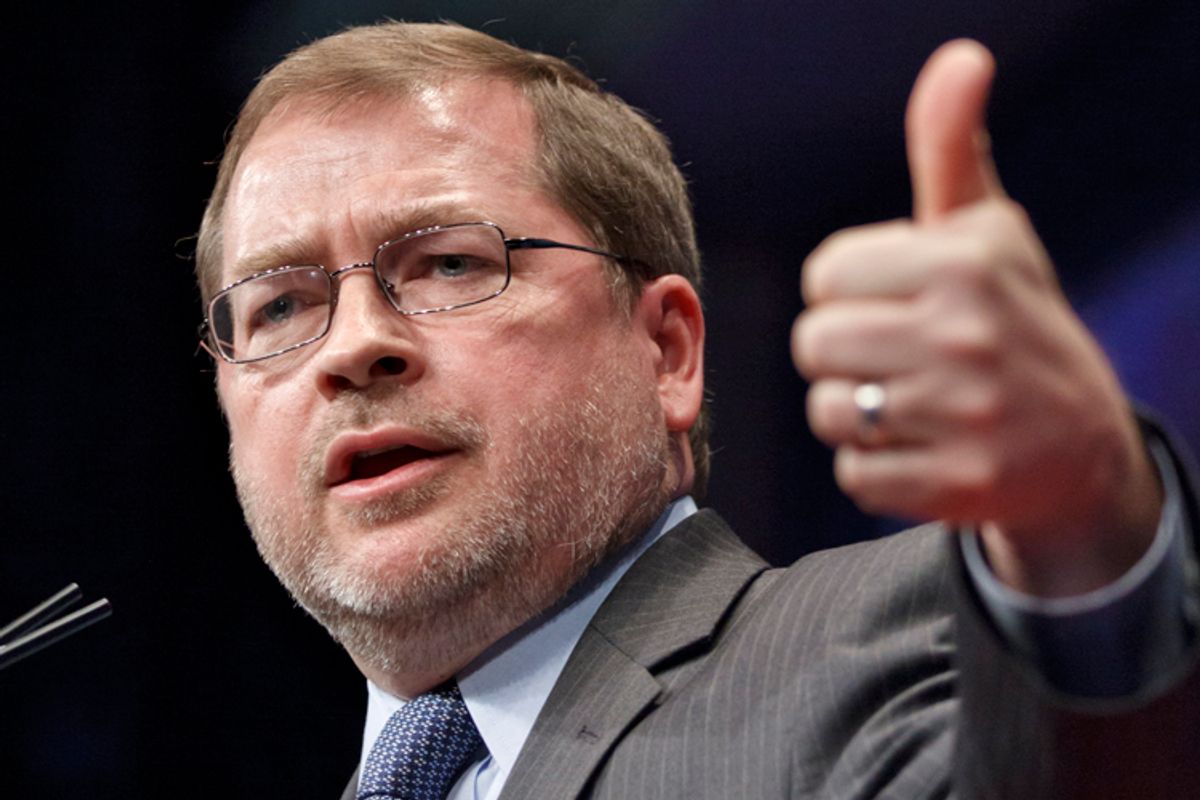“How did we do it in Wisconsin?” RNC Chair Reince Priebus asked Saturday morning. “The simplest way I can tell you is we had total and complete unity between the state party, quite frankly, Americans for Prosperity, the Tea Party groups, the Grandsons of Liberty. The [Glenn Beck-instigated] 9/12ers were involved. It was a total and complete agreement that nobody cared who got the credit, that everyone was going to run down the tracks together.”
Priebus made his comments on a Saturday morning CPAC panel addressing how conservatives could fight and defeat organized labor state by state. Moderator Grover Norquist, the president of Americans for Tax Reform, opened the panel by suggesting that conservatives had been neglecting the union issue in recent years out of a mistaken sense that private sector union demise was inevitable, and that public sector union decline was impossible.
Rather, argued Norquist, a raft of National Labor Relations Board appointments by Obama – who he said had made a strategic error by prioritizing Obamacare over a pro-union “card check” bill – would make this “the time for the other team to cheat” and hike private sector unionization. (Pro-labor scholars have questioned how much impact proposed rules from the NLRB, a body which lacked a quorum for some stretches of Obama’s presidency, will have on union efforts.) Meanwhile, said Norquist, Republican victories in the states offered a chance to “fix a lot of the abuses that we thought we’d have to live with” in the public sector. “Wisconsin,” Norquist later told the crowd, “is the model.”
Scott Walker’s 2011 “budget repair” law, passed amid a high-profile multi-week protest occupation of the state capitol, severely reduced the right of public employees to collectively bargain, effectively imposed public sector “Right to Work,” and required regular “re-certification” elections among employees on whether to retain their now-narrowed form of union recognition.
Panelist Luke Hilgemann, the current Americans for Prosperity COO who formerly led the Koch-backed group’s Wisconsin efforts, told the crowd that the 2011 victory “started back in 2007 on the shores of Lake Michigan,” at a meeting of fifteen intrepid activists who’d “had enough of government overreach,” including then-Milwaukee County Executive Scott Walker. Priebus, a former Wisconsin GOP head, credited the ability to pass Walker’s reforms in part to the party and Tea Party activists unifying well before the 2010 primary behind candidates that made voters “proud to wake up” and vote, like Ron Johnson, Paul Ryan, and Walker. Norquist shared that Walker, after deciding to do a hasty signing of the “budget repair” bill prior to the official event, in order to stave off attempts to sign union contracts before it became law, gave Norquist the pen he used to sign the bill.
Panelist Vincent Vernuccio, of the Mackinac Center for Public Policy, said that Walker’s success, and Indiana’s 2012 “Right to Work” law, helped make possible the subsequent passage of “Right to Work” in Michigan– a state Norquist said national “Right to Work” activists hadn’t had “on their hit list.” Vernuccio also credited that victory in the United Auto Workers’ stronghold to activists “working on Right to Work in Michigan for over twenty years”; the passage of prior “small reforms” that laid the groundwork; and overreach by unions whose failed 2012 collective bargaining constitutional amendment he said helped spur “Right to Work” despite GOP Governor Rick Synder’s previous claim the issue was “divisive.” (In contrast, unions point to pressure on Snyder, who had already signed other anti-union legislation, from top donors who’d helped fuel his victory.)
Panelists also celebrated the UAW’s defeat in last month’s Volkswagen unionization vote in Tennessee; without mentioning pre-vote GOP politicians’ warnings that a pro-union vote could have cost the company tax breaks, Capitol Research Center President Terry Scanlon said that in Chattanooga, “for the first time, maybe, we had our side with some dollars to fight this unionization,” and that defeating the union would mean “much less money for Democrats - and not only money, but workers” getting out the vote. Echoing some UAW critics on the left, Vernuccio said the UAW had secured “a sweetheart deal” with VW management by promising to keep down costs, and “what do you think that cost savings is going to come from? It’s going to come from the backs of the workers that they are claiming to represent.”
Asked about the 2011 repeal, by referendum, of Ohio Governor John Kasich’s bill curtailing public sector union bargaining, Vernuccio said that the bill was vulnerable because its authors “clumped everything into one huge bill,” because it hadn’t gone into effect yet when the referendum happened, and because “Governor Kashich just didn’t pick up the phone” to fight for it. Scanlon suggested it had been a “smart move” in Wisconsin, unlike Ohio, to exempt popular police and firefighter unions from the anti-union law.
Looking forward, Norquist asked Vernuccio where “Right to Work” would next pass; Vernuccio cited “movements” afoot in Ohio, Missouri, and Kentucky. “It’s not going to be another ten years until we get another Right to Work state,” he told the crowd. Responding to an audience member from Connecticut who’d asked for advice (Norquist had joked “move”), Vernuccio said if “you can get Right to Work in Michigan, you can get it anywhere, Connecticut included.” Vernuccio also touted the “recertification” provision of Walker’s law as “an absolute game-changer,” and said “there a couple of other states that are dabbling with it now.”
The New York Times’ Steven Greenhouse reported last month that membership in the Wisconsin State Employees’ Union, one of several affected by the law, had fallen by 60 percent. “I speak to union officials in other states,” WSEU Director Marty Biel told Greenhouse, “and I tell them, ‘Don’t be misled.’ We thought this could never happen here. But it did.”

Shares